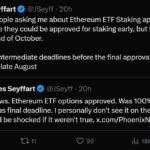In an exciting development for the cryptocurrency landscape, fintech commercial real estate platform Janover (JNVR) is making significant strides by adopting a new treasury strategy centered around Solana (SOL). The company has amassed a Solana stack worth an impressive $21 million and recently made headlines by acquiring an additional 80,567 SOL tokens, valued at approximately $10.5 million. This brings its total holdings to 163,651 SOL tokens.
Janover is aspiring to replicate the success seen by Bitcoin (BTC) through a strategic pivot, positioning itself as the first publicly-traded U.S. company with a treasury focused on Solana’s digital asset. This ambitious move comes on the heels of leadership changes, with key figures from the crypto exchange Kraken, including Joseph Onorati and Parker White, now at the helm of Janover. Onorati has taken the role of chairman and CEO, while White serves as chief investment officer and chief operating officer.
The firm’s journey into the crypto space has already seen remarkable financial outcomes; since announcing its crypto pivot in early April, Janover’s share prices have skyrocketed over 1,700%. Recently, shares are trading around $73.74, reflecting a substantial gain as the market responds to Janover’s innovative approach.
“After building in the crypto industry for more than a decade, we are at a tipping point in mass DeFi adoption. We’re proud to be the first to introduce a digital asset treasury strategy in the US public markets initially focused on Solana,” stated Onorati.
In addition to its crypto ambitions, Janover plans to operate validators in Solana’s proof-of-stake network. However, the company reassures stakeholders that it remains committed to its roots in commercial real estate, continuing to leverage its artificial intelligence-powered platform under the guidance of founder Blake Janover and CFO Bruce Rosenbloom. With such a dynamic shift towards integrating cryptocurrency, Janover might just be setting the stage for a new era in both fintech and real estate.

Janover’s Bold Pivot to Solana: Key Insights
Janover (JNVR) has made significant shifts in its business strategy by investing heavily in Solana (SOL), and this move could impact various stakeholders in the crypto and real estate sectors.
- Strategic Bitcoin Playbook Replication:
- Janover is aiming to replicate the successful Bitcoin treasury strategy but with Solana.
- This pivot highlights increased interest and confidence in alternative cryptocurrencies.
- Substantial Investments:
- The company has built a $21 million SOL stack and bought an additional $10.5 million in SOL tokens.
- Such investments may influence investor sentiment toward both Janover and Solana.
- First Publicly-Traded Company with a Solana-Centric Treasury:
- Janover positions itself uniquely in the market by focusing on a specific cryptocurrency.
- This can attract both crypto investors and those interested in innovative financial strategies.
- Leadership from Former Kraken Executives:
- The new leadership team brings extensive experience from the crypto exchange sector.
- This credibility might enhance trust in Janover’s strategy among investors and the market.
- Explosive Stock Growth:
- Janover’s share price has skyrocketed over 1,700% since the announcement of its crypto pivot.
- Such growth indicates the potential for significant financial returns for investors during periods of innovation.
- Continued Focus on Real Estate:
- Despite the pivot to crypto, Janover’s core operations in commercial real estate remain intact.
- This balance could appeal to investors looking for stable growth alongside innovation.
Janover’s Bold Move into Solana: A New Frontier in Fintech
Janover’s recent transition to embracing Solana (SOL) as the cornerstone of its treasury strategy highlights an innovative approach that could reshape the landscape for fintech firms, particularly those involved in commercial real estate. By amassing a substantial SOL stack valued at roughly $21 million, Janover not only positions itself uniquely as the first publicly-traded U.S. company with such a focus but also endeavors to tap into the burgeoning demand for decentralized finance (DeFi).
In comparison to established competitors, Janover’s early adoption of SOL as a treasury strategy offers distinct advantages. The company’s foresight in pivoting towards cryptocurrency—particularly one known for its scalability and speed—shows a level of agility that larger institutions often lack. With a staggering surge in share price and significant gains for early investors, Janover is effectively leveraging the hype surrounding digital assets to attract a new wave of capital and market interest.
However, this bold pivot isn’t without potential drawbacks. The volatility associated with cryptocurrencies may pose risks for the company, particularly if market sentiment shifts rapidly. Additionally, while Janover benefits from the expertise of former Kraken executives, the fast-paced world of crypto may challenge even seasoned professionals when unforeseen regulatory changes or market crashes occur. Stakeholders with conservative investment strategies may view Janover’s aggressive alignment with SOL as overly risky, creating a divergence in potential investor demographics.
Considering the current landscape, Janover’s strategic move primarily appeals to tech-savvy investors eager to capitalize on the DeFi trend, as well as those with a penchant for higher risk, higher reward scenarios. Conversely, traditional real estate investors and risk-averse shareholders may find themselves uncomfortable with the fluctuating nature of cryptocurrencies, potentially leading to shareholder discontent if the strategy doesn’t yield expected returns. Despite these concerns, Janover’s backing from a team with deep-rooted experience in both digital assets and public markets could help mitigate some risks—if executed thoughtfully.
In essence, while Janover’s entry into the crypto space signals an exciting opportunity for growth and innovation, it simultaneously presents challenges that could polarize stakeholders within the real estate and fintech communities.

















